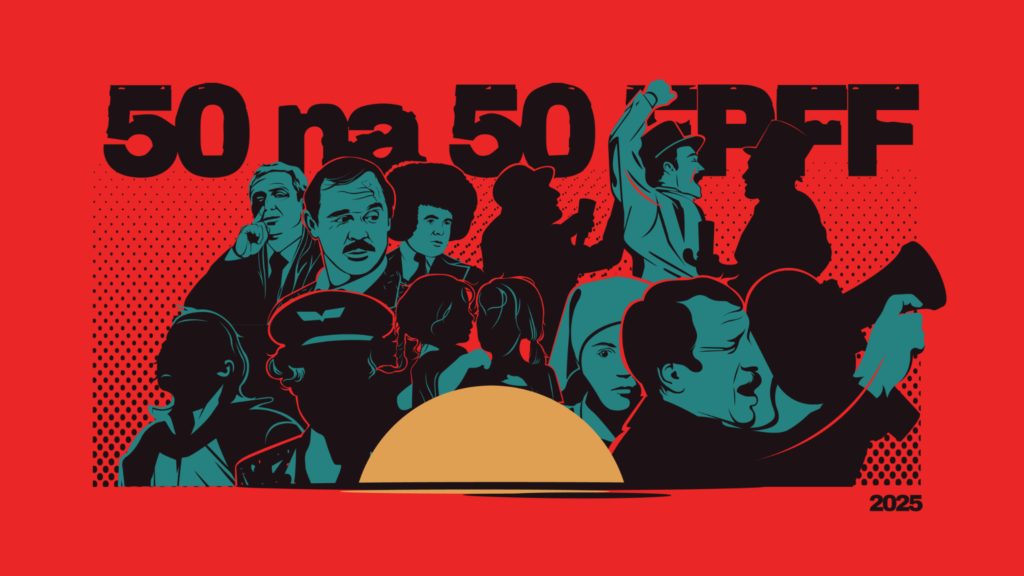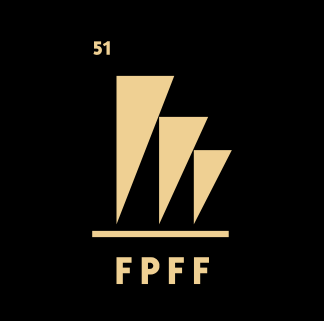“50 for 50” project – the yearlong all-Poland celebration of the 50th edition of the PFF

In March, we started to celebrate the 50th anniversary of the Polish Film Festival in Gdynia. The 50th edition of the Festival is a perfect moment to look back. After all, the history of the PFF is the history of Polish cinema! As part of the yearlong all-Poland “50 for 50” project, we recall milestone events, important films and outstanding filmmakers – proving there are endless ways to talk about the festival.
– It’s difficult to imagine Polish cinema without the Polish Film Festival. For 50 years, Gdynia and every edition of the festival have gathered the most talented filmmakers and film professionals. The Golden Lions award has become an indicator of what is most important in Polish cinema. A half century of history makes up an incredible story, which is an even greater achievement for a cultural event taking place regularly. The jubilee creates an opportunity to open up even more to audiences and reach cities and towns in other parts of Poland. Therefore, for the period until the end of this year, 57 institutions participating in the “50 for 50” project will bring Polish cinema closer to audiences. Given that culture is a common good, I’m doubly pleased that film and the festival, which is an integral part of culture, will resonate in the entire country. I encourage you to visit arthouse and open-air cinemas – says Hanna Wróblewska, the Minister of Culture and National Heritage.
A huge inauguration of the project took place in the Gdynia Film Centre. Under the heading “Festival Biographies. The Restored Stories” we evoke rewarded biographical films which were not presented to audiences during the pandemic edition of the festival. At the project’s inauguration, held on 8th March, we watched The Master by Maciej Barczewski and we had the opportunity to meet the director and the starring actor Piotr Głowacki. As is usually the case at jubilee events, there were also greetings, a layer cake and singing along “Happy Birthday”. The event was attended by, i.a.,: Maciej Dydo (Director of the Department of Copyright and Film, Ministry of Culture and National Heritage), Tomasz Kolankiewicz (Director of the National Film Archive – Audiovisual Institute, Artistic Director of the PFF from 2020 to 2023), Daniel Witowski (Head of the Media Communication Department of the Polish Film Institute), Oktawia Gorzeńska (Deputy Mayor of the City of Gdynia), Joanna Łapińska (Artistic Director of the Polish Film Festival), Michał Chaciński (Artistic Director of the PFF from 2011 to 2013) and representatives of authorities of the City of Gdynia, Pomeranian Film Foundation in Gdynia, Gdynia Film Centre and the organisational team of the Polish Film Festival.
Goplana Cinema in Połczyn-Zdrój has already held the first reviews during which we were demonstrated “The Power of Women” through films such as Man of Marble by Andrzej Wajda, The Scream by Barbara Sass and It’s Not My Film by Maria Zbąska, and a meeting with Maria Zbąska and the costume designer Sławomir Blaszewski. At Janosik Cinema in Żywiec we celebrated together with Tomasz Pankiewicz about “The Generational Cascades” and Camera Buff by Krzysztof Kieślowski; and in the Gdański Archipelag Kultury (GAK) Winda, together with Mirosław Przylipiak and Jacek Wojsław, we were wondering about the “The Power of Propaganda and Censorship” taking a closer look at films such as The War of the Worlds: Next Century by Piotr Szulkin, Escape from the ‘Liberty’ Cinema by Wojciech Marczewski and Leave No Traces by Jan P. Matyszyński
– It was a real pleasure and a great honour for me to participate in the jubilee “50 for 50” project of the Polish Film Festival run in Połczyn-Zdrój. The event focused on women in film – those who carry their cross and fight for independence. The meeting was attended also by the costume designer Sławek Blaszewski. This was an extraordinary meeting. What touched me was the fact that it is not only the script and the actor that make up the protagonist but it is also the costume. The costume becomes the first visual indicator. Wanda from ‘It’s Not My Film’, clothed with her jacket and hooded, was created by Sławek with great care and precision. In the severity of measures he found solutions that tell with the image that Wanda does not agree to the comfortable world of practical, adjusted objects that could easily be replaced. She runs against these features. We are proud that our protagonist was presented along with figures such as Agnieszka played by Krystyna Janda in Andrzej Wajda’s film or Marianna – great performance by Dorota Stalińska in “The Scream” directed by Barbara Has. I think that if only these women had a chance to meet, they would have a lot to talk about. I’m grateful for the invitation and the amazing meeting with audience – comments the film director Maria Zbąska.
– I am very proud of the “50 for 50” programme, which is so diversified and multidimensional. I would like to thank our key partners: cultural centres, film society cinemas (DKF), cinemas, festivals and film schools. Owing to them, we will be able to appear in so many places in Poland, from Sejny to Sucha Beskidzka – comments Joanna Łapińska, the Artistic Director of the PFF.
In April, join us for:
“Festival Echoes” Wytwórnia Otwarta | the Documentary and Feature Film Production Company, Warsaw
3.04 Camouflage, dir. Krzysztof Zanussi, screening preceded by a meeting with the film director
10.04 Fever, dir. Agnieszka Holland, screening preceded by a meeting with the film director
17.04 Little Rose, dir. Jan Kidawa-Błoński, screening preceded by a meeting with the film director
24.04 Escape from the ‘Liberty’ Cinema, dir. Wojciech Marczewski, screening preceded by a meeting with the film director
“Film Space” Wolskie Cultural Centre | Community Cultural Centre, Warsaw
4.04 Autumn Girl, dir. Katarzyna Klimkiewicz, an after-screening meeting with the production designer Wojciech Żogała
12.04 The Last Family, dir. Jan P. Matuszyński, an after-screening meeting with the production designer Jagna Janicka
27.04 The Silent Twins, dir. Agnieszka Smoczyńska, an after-screening meeting with the production designer Jagna Dobesz
“A Heavy Blow” Culture and Recreation Centre in Wschowa
4.04 Pigs, dir. Władysław Pasikowski; Symmetry, dir. Konrad Niewolski; The Dark House, dir. Wojciech Smarzowski
“It Began Here…” Kino Kameralne Cafe, Gdańsk
8.04 The Hourglass Sanatorium, dir. Wojciech Jerzy Has and a lecture by the film expert Bartosz Filip
10.04 Zapis zbrodni, dir. Andrzej Trzos-Rastawiecki and a lecture by the film historian Paweł Biliński
13.04 The Illumination, dir. Krzysztof Zanussi, an after-screening meeting with the film director
“Cinema as a Barometer of Social Moods” Kinoteatr Rondo, Chełmno
13.04 Leave No Traces, dir. Jan P. Matuszyński and a lecture by the film historian Piotr Sołtysiak
“The Defeated Seven” Kino – Galeria Charlie, Łódź
26.04 Pornography, dir. Jan Jakub Kolski, an after-screening meeting with the film director and Krzysztof Majchrzak
“Festival Biografies. The Restored Stories” Gdynia Film Centre, Gdynia
25 Years of Innocence, dir. Jan Holoubek (more details to be provided later)
_______
As part of the “50 for 50” project, in 34 cities as many as 57 institutions organise film reviews focusing on a selected fragment of the history of the PFF. The screenings are accompanied by meetings with guests who talk about the screened films and share their festival memories. That is how we will learn the history of the PFF through outstanding filmmakers, such as Andrzej Wajda, Krzysztof Kieślowski, Paweł Pawlikowski, Jerzy Stuhr, Agnieszka Holland, Janusz Zaorski, Marek Koterski, Małgorzata Szumowska and Daniel Olbrychski. The younger generation will be represented by filmmakers such as: Agnieszka Smoczyńska, Jan P. Matuszyński, Korek Bojanowski, Piotr Domalewski and Maria Zbąska. Some of the events focus on genre cinema and films for young audiences, other concern milestone events, such as the first festivals organised in Gdańsk, awarding Man of Marble with the symbolic brick or the pandemic 45th edition of the Festival, held entirely online. The topics cover issues such as rebellion, power of women, diversity, otherness and dialogue. The programme includes also classics and canon titles, as well as winners of the Golden Lions and the Don Quixote awards.
Events organised as part of the “50 for 50” project will be held from March to December 2025. The project is run in arthouse cinemas, open-air cinemas, and also in film society cinemas (DKF). Cultural centres, libraries and media collections organise their reviews too. The offer is addressed also to university and film school students. The 50th anniversary of the PFF is celebrated also by other festivals, such as: Tofifest International Film Festival in Toruń, Kino Na Granicy Film Festival, Summer Film Academy in Zwierzyniec and Bana Film Festival in Pleszew.
The list of all reviews held as part of the “50 for 50” project and the map of their location is available at: https://festiwalgdynia.pl/50-na-50/. Detailed information on particular events will be available on websites of partner institutions.
The organiser of the “50 for 50” project is the Pomeranian Film Foundation in Gdynia – the producer of the Polish Film Festival. The project was co-financed by the Minister of Culture and National Heritage and the Polish Film Institute. The main partner of the “50 for 50” project is the National Film Archive – Audiovisual Institute. The project is organised in partnership with the Documentary and Feature Film Production Company and Telewizja Polska. The media patrons of the projects are: Telewizja Polska, Polska Press Grupa, naszemiasto.pl, Program 1 Polskiego Radia, Program 3 Polskiego Radia, Magazyn Filmowy SFP, Filmweb, Interia, Miesięcznik KINO.

